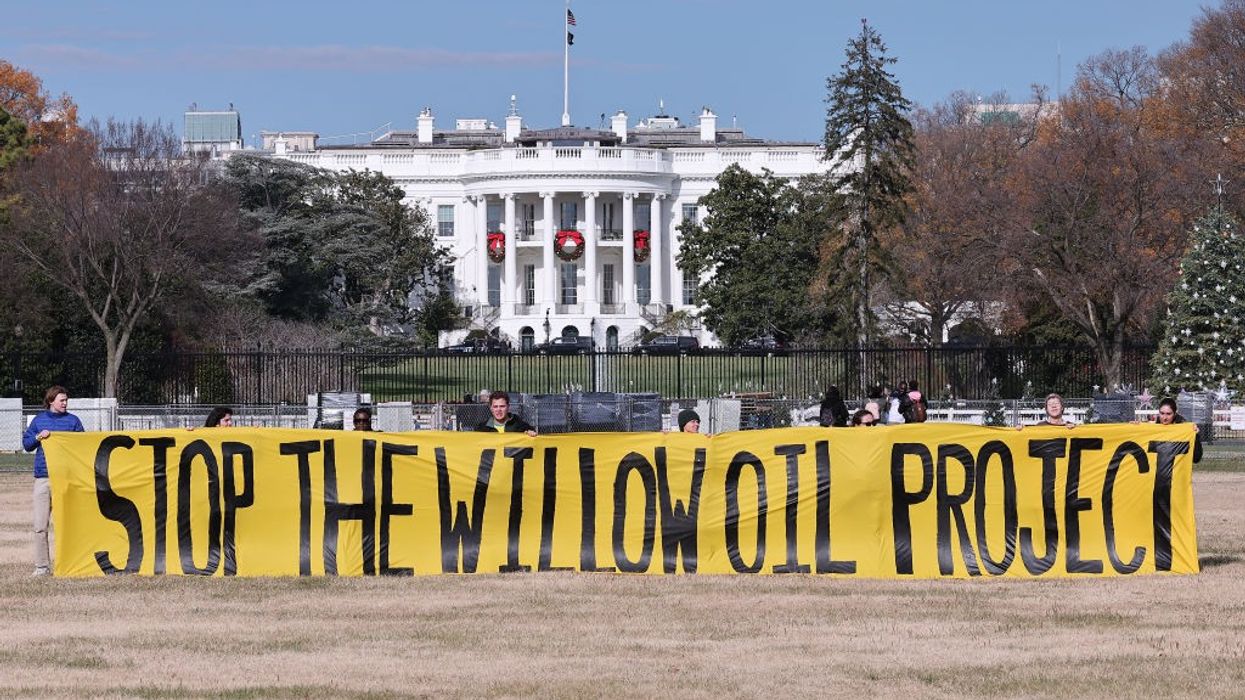US Must Stop Extracting Fossil Fuels by 2031 for Fair Road to 1.5°C
A new report also concludes that the United States should put $97.1 billion per year toward helping poor countries with their energy transitions.
In order to limit global heating to 1.5°C in a way that prioritizes climate justice, wealthy nations like the United States must stop extracting oil, gas, and coal by 2031.
That's the conclusion of a report released Tuesday by the Civil Society Equity Review titled Equitable Phaseout of Fossil Fuel Extraction: Toward a Reference Framework for a Fair and Rapid Global Phaseout. The report, published to coincide with the ongoing United Nations Climate Change Conference (COP28) in the United Arab Emirates, provides both timelines of when it would be fair for different countries to end fossil fuel extraction and payment schedules for how much wealthier nations should provide to help poorer ones finance their energy transitions.
"Limiting warming to 1.5°C requires all countries to reduce their fossil fuel extraction and use, starting now. But fairness dictates that some should reduce faster than others," Greg Muttitt of the International Institute for Sustainable Development and Global Gas and Oil Network said in a statement. "To make a just transition possible in countries whose economies depend heavily on fossil fuel revenues and jobs, wealthy countries should phase out their fossil fuels within just eight years, and provide significant amounts of support to poorer countries."
"The only hope that we'll back away from the brink is a globally fair arrangement that gives poorer countries the time and resources to manage rapid transitions away from fossil fuel production and consumption."
The new report came the day after the publication of the annual Global Carbon Budget report, which found that carbon dioxide emissions from the burning of fossil fuels reached a record 36.8 billion metric tons in 2023 and that, if human societies continue to burn fossil fuels at current rates, they have a 50% chance of pushing temperatures consistently above 1.5°C in around seven years.
"All countries need to decarbonize their economies faster than they are at present to avoid the worse impacts of climate change," Corinne Le Quéré, Royal Society research professor at the University of East Anglia's School of Environmental Sciences, said in response to the Carbon Budget findings.
The Civil Society Equity Review agreed that emissions must fall rapidly everywhere, but argued that "this will be politically achievable only if it is widely accepted as fair."
"The speed and scale of the transformations required to move away from the fossil economy can look daunting, particularly in countries that are dependent on fossil fuel revenues, while millions of people within them depend on fossil fuel extraction for jobs and livelihoods," Anabella Rosemberg, senior adviser on just transition for Climate Action Network International, said in a statement.
The report concluded that
- No country should build any new infrastructure for extracting fossil fuels;
- Wealthy countries that are less dependent on fossil fuels, including the U.S., U.K., Australia, Germany, and Canada, should stop all extraction by 2031;
- Countries that are generally less dependent on fossil fuels should stop extraction by the early 2030s; and
- Poorer nations that are highly reliant on fossil fuels should stop all extraction by 2050.
"Everyone knows that countries' mitigation pledges under the Paris agreement are far off track from keeping warming below 1.5°C, or even 2°C. But there is far less awareness that countries' and corporations' plans for producing oil, gas, and coal are even farther off track," said Sivan Kartha of the Stockholm Environment Institute.
"Practically speaking," Kartha continued, "the only hope that we'll back away from the brink is a globally fair arrangement that gives poorer countries the time and resources to manage rapid transitions away from fossil fuel production and consumption."
The report also provides guidelines for those resources based on "fair share" contributions from wealthier nations derived from their capacity and their responsibility for the climate crisis. The U.S., which is the No. 1 historical emitter of carbon pollution, would owe 46.3% of the total, or $97.1 billion per year. The E.U. comes next, owing 20.7% or $43.4 billion per year. It is followed by Japan (9.3% and $19.5 billion), Canada (4.1% and $8.6 billion), and the U.K. (3.8% and $8 billion.)
"The Civil Society Equity Review report clearly shows that the richest countries are largely responsible for the climate crisis. They also have the greatest capacity to deliver the solutions we need," Oxfam International climate policy lead Nafkote Dabi said in a statement. "Rich countries should be the first to commit to the phaseout of fossil fuels. They should also commit to providing crucial financial support to developing countries to facilitate their transition to clean energy."
The Civil Society Equity Review was first convened in 2015 and now has the backing of more than 500 organizations and movements. Its latest report comes amid the greatest push to negotiate a total phaseout of fossil fuels at a U.N. climate conference to date.
"As the climate negotiations pivot, finally, to the central issues of fossil fuel extraction and developmental justice, this report steps back and takes a long-overdue hard look at the overall structure of the problem," Tom Athanasiou of the Climate Equity Reference Project said in a statement. "Its goal is to move the discussion forward and we think that, by giving real numbers—both phaseout dates and support needs—it does just that."
